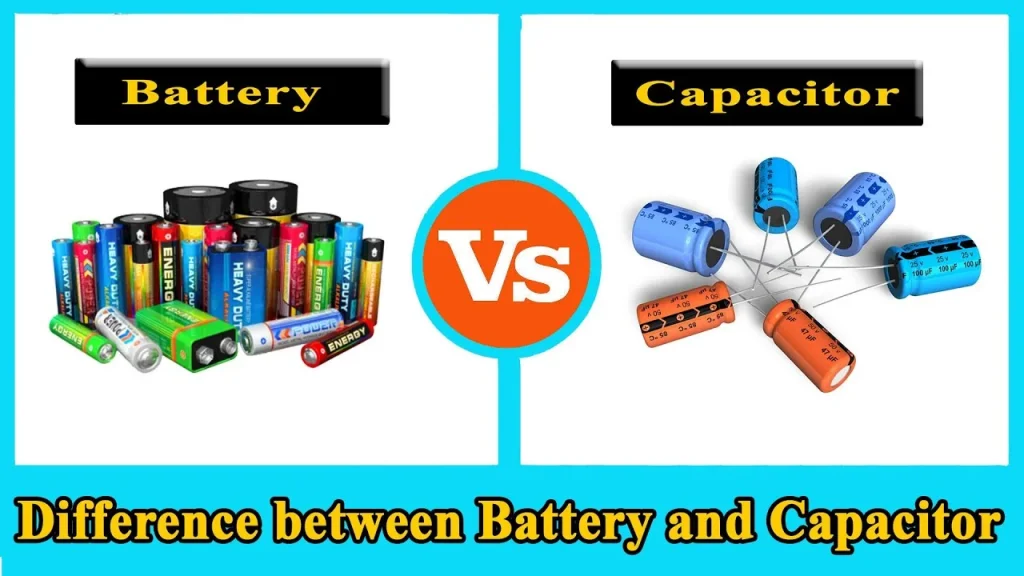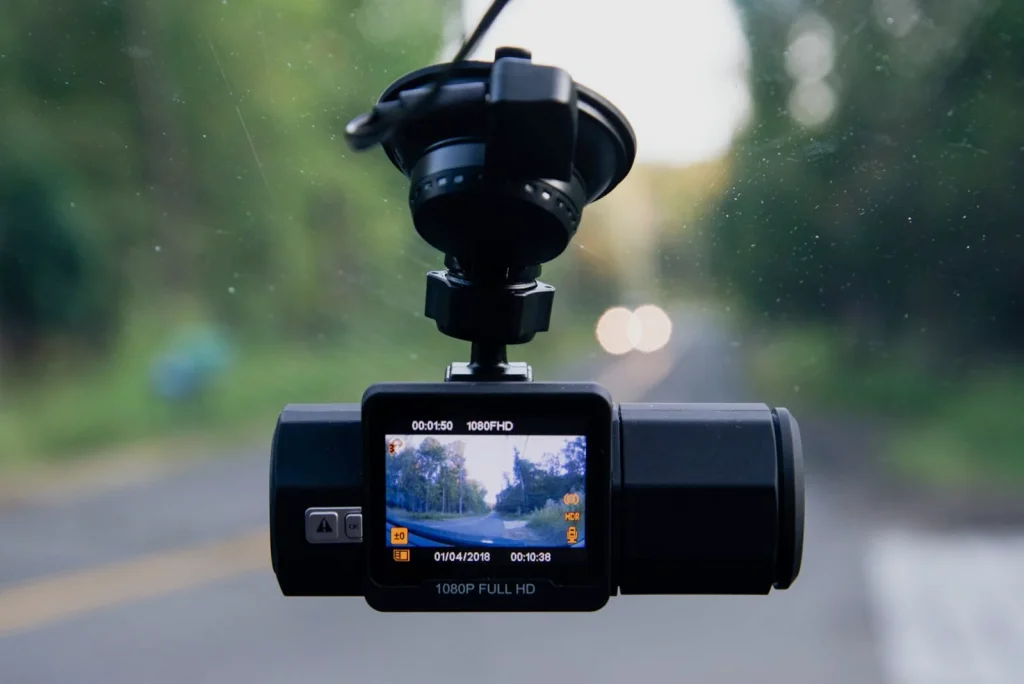Dash Cam Battery VS Capacitor
When it comes to the topic of dash cams, there are a lot of different opinions on which is the best type of battery to use.
Some people swear by capacitors while others insist that dashcam batteries are the only way to go.
So, which is better? Let’s take a closer look at the dash cam battery vs capacitor.
In this post, we will take a look at the battery and capacitor and see which one comes out on top.
We will explore the pros and cons of each type of power storage and help you decide which is best for you. So, let’s get started.
Dash Cam Battery vs Capacitor – Basic Difference

Battery which is typically a Lithium-ion battery is a battery pack that is connected with the dash cam, it provides power to the Dashcam and this power is good for up to 8 hours.
Dashcams normally use a supercapacitor which just like a capacitor stores electrical charge between two metal plates, in addition to that it can be charged and discharged continuously or in a very short time.
The battery is usually hard-wired through a hard-wiring kit that has a low-voltage cutoff, this prevents the battery from getting drained.
See Also: Should I Hardwire My Dash Cam
Supercapacitor stores charge between two electrostatically charged metal plates with a dielectric in the middle. It provides constant current till it discharges.
Batteries have a much longer life span and can record hours after the power is switched off.
The capacitors are mostly used in high-resolution cameras because they don’t trip even in hot temperatures as well.
What Are The Batteries?

Whether it be a dash cam or another electronic gadget, batteries are often used to power your equipment.
Rechargeable lithium-ion batteries are what we refer to when we discuss dash cameras.
These are well renowned for being quite affordable, making them very popular among people who would rather spend more money on dash cams.
One of their main drawbacks is that battery-powered dash cameras cannot tolerate temperature fluctuations and sustain significant damage.
Such batteries cannot withstand extreme heat or cold, which makes them challenging in several situations.
What Are The Capacitors?

In general, the capacitors or supercapacitors used in dash cameras are rechargeables.
This charge is significantly faster than typical capacitors and has a far larger capacity for charge storage.
They can also resist temperature extremes, regardless of how hot or cold it is outside. Both the capacitors and your dash cam will not be harmed by it.
However, they don’t hold a charge for as long as batteries; thus, they discharge quickly. Additionally, most dash cams that run on capacitors are also pricey.
Differences Between A Dash Cam Battery And A Capacitor

Both batteries and capacitors have benefits and drawbacks. Capacitors function substantially better than batteries overall.
High-end dash cams increasingly use capacitors rather than batteries in the recording sector.
Lithium-ion batteries continue to be employed at the low end. Let’s now examine the distinction between a capacitor and a battery.
There are a few key differences between a dash cam battery and a capacitor.
1. Last up to
Capacitors can last up to four hours, while batteries last for around 30-60 minutes.
2. Susceptible
A battery is more susceptible to temperature changes and may need to be replaced more frequently than a capacitor.
3. Resistance
Capacitors are more resistant to extreme weather conditions and are less likely to fail than batteries.
4. Reliablility
Bodies undoubtedly provide a more reliable power source, while capacitors offer a greater power reserve.
5. Expensive
A capacitor is typically more expensive than a battery
Pros And Cons Of Dash Cam Capacitor:

Following are the pros and cons of using a capacitor for your dashcam:
Pros:
- A capacitor can help to provide a more stable voltage to your camera, which can result in less “fuzzy” or “snowy” footage.
- If you live in an area with extreme temperatures, a capacitor can help to prevent your camera from overheating or freezing.
- A capacitor can also help to prolong the life of your camera by providing a steadier power supply.
- No risk of the battery dying and missing an important event-can record for long periods without having to worry about running out of power.
See Also: Will A Dash Cam Drain My Battery
Cons:
- Must be hardwired into the vehicle’s electrical system-takes more time and effort to install.
- If the power goes out, the recordings will be lost-risk of losing important footage.
- Not as widely available as battery-powered models-may have to search a bit harder to find one that meets your needs.
- If not installed properly, a capacitor can cause your camera to overheat.
Pros And Cons Of Dash Cam Battery:

Pros:
- You don’t have to worry about your car battery dying if you forget to turn off your dash cam.
- Some newer car models come with a feature that will automatically turn off your dash cam when the ignition is turned off, but if your car doesn’t have this feature, a battery can be a lifesaver.
See Also: How Much Power Does a Dash Cam Use
Cons:
- They also take longer to start recording since the battery has to charge first.
- If the power goes out, the recordings will be lost.
- The battery will eventually die, and you’ll have to recharge it or replace it. If you forget to turn off your dash cam, the battery will drain faster.
- A battery can also add weight to your dash cam, which can impact its performance.
Which Is Better – A Dash Cam Battery Or Capacitor?

Capacitors function substantially better than batteries overall.
High-end dash cams are increasingly used in the recording industry instead of batteries.
Lithium-ion batteries continue to be employed at the low end.
- In most cases, a capacitor should be utilized over a battery.
- In addition to being more dependable, capacitors can resist high temperatures.
- Since dash cams are frequently mounted on windshields in full sunlight, adverse weather is a factor to be considered when choosing one.
The temperature inside a car cabin can rise quickly; therefore, you’ll need a device that can handle the heat.
Because of this, more high-end dash cam brands use capacitors rather than batteries.
Capacitors will have greater capacitance, or the capacity to hold more charge, as technology advances.
As a result, dashcams will probably be able to run longer on capacitors in a few years.
Final Verdict:
Battery-powered dash cams can provide power for longer periods of time, so they are a good choice when you need a long-lasting power source.
In contrast, a capacitor can provide power for a shorter period of time, but it will recharge much faster than a battery.
You might want to consider a capacitor if you use your dash cam frequently.
You can also use a capacitor to prevent your camera from overheating or freezing if you live in an area with extreme temperatures.
Ultimately, you have to decide between a dash cam battery and a capacitor based on your specific needs.
Everything now depends on the more important aspects to you and will help you choose the best option.
Capacitors are the best option if you use them for a long time.But if money is a big concern, batteries are a clear alternative.
Before making a choice, be careful to consider every aspect and distinction.
Thanks!


![How To Format An SD Card For A Dash Camera? [5 Ways]](https://owndashcam.com/wp-content/uploads/How-To-Format-An-SD-Card-For-A-Dash-Camera-768x566.webp)



